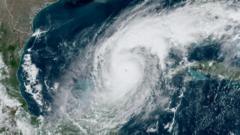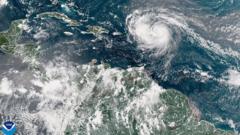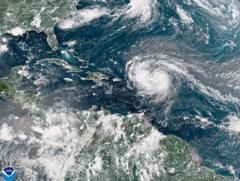NOAA warns of an above-average Atlantic hurricane season, forecasting 13-19 tropical storms and 6-10 hurricanes. However, staffing cuts under President Trump's administration have raised alarms about the ability to effectively track and prepare for these storms.
Concerns Rise Over Hurricane Forecast Accuracy Amid Research Cuts

Concerns Rise Over Hurricane Forecast Accuracy Amid Research Cuts
The upcoming Atlantic hurricane season faces a heightened risk, with forecasters worried that staffing losses from budget cuts may impede accurate storm predictions.
The National Oceanic and Atmospheric Administration (NOAA) predicts an exceptionally active Atlantic hurricane season this year, forecasting between 13 to 19 named tropical storms from June to November. These predictions have been shaped by warmer sea temperatures and favorable atmospheric conditions, with the potential for 6 to 10 of these storms to develop into hurricanes. However, the forecast has been accompanied by serious concerns regarding the accuracy of hurricane predictions due to significant cuts to research funding and staff layoffs under President Trump’s administration.
The projected hurricane season is expected to bring more storms than the long-term average; however, it will not exceed the previous year’s numbers, which included 18 tropical storms, 11 hurricanes, and 5 major hurricanes. Experts indicate that climate change, while not increasing the total number of storms globally, may contribute to more intense hurricanes with higher wind speeds and increased rainfall, raising the risk of coastal flooding. Two key factors influencing this year's forecast include above-average sea surface temperatures across the tropical Atlantic and the near absence of the natural weather pattern known as El Niño, which historically hinders Atlantic hurricane development.
Serious concerns have been raised regarding the staffing cuts that have plagued NOAA in recent months. Hundreds of researchers have been laid off, generating fears that the agency's ability to track storms and issue timely warnings might be severely compromised as the peak hurricane season approaches. Some experts warn that fewer staff may lead to exhausting workloads, which jeopardizes hurricane forecasting capabilities in regions like Texas, where staffing vacancies have reportedly worsened.
The implications of these cuts stretch far beyond domestic shores. Experts emphasize the need for comprehensive global data to make accurate weather predictions. They argue that if U.S. forecasting becomes less reliable, it could have repercussions felt worldwide. As NOAA prepares for the hurricane season, the acting administrator reassured the public that they remain committed to accuracy and continued advancements in weather forecasting, notwithstanding the significant operational challenges posed by budgetary constraints and staffing shortages.
With these looming threats, many meteorologists voice urgent calls for the restoration of crucial staffing levels and funding in order to meet the increasing demands of the upcoming hurricane season, and maintain the progress made in storm forecasting accuracy over the years.






















